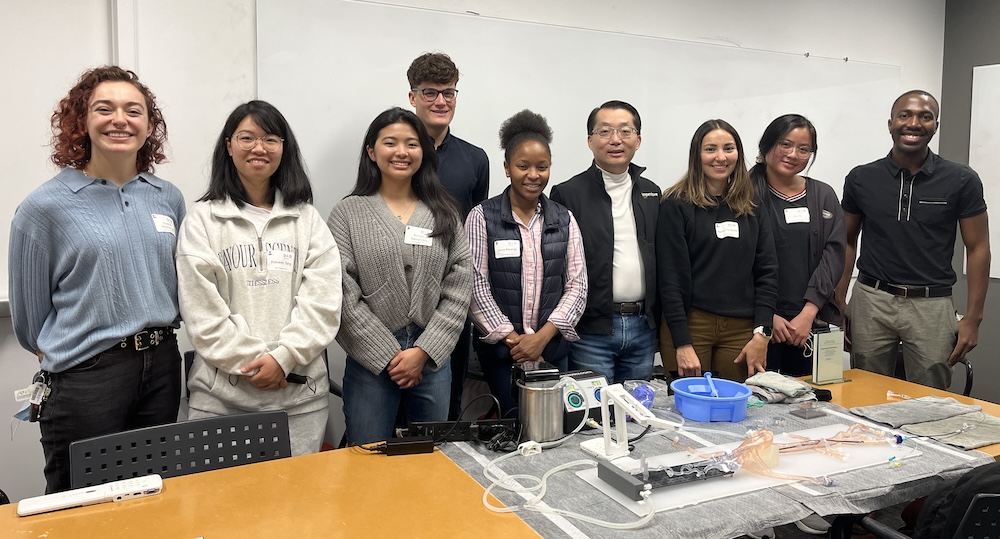Kirsten Takeshima participated in DxD’s inaugural cohort of Pathways in Health Technology program in 2023. Now a Molecular, Cell & Developmental Biology major at UCLA, Kirsten shares insights from how DxD influenced her journey, and offers advice for others exploring career opportunities.
 I’ve always had an interest in biology and human physiology but really became fascinated with medicine after witnessing the impact of cancer on some family members. At a young age, my grandmother passed away from lung cancer and at the time, it was difficult for me to understand the suffering she had to endure. We would visit her at the hospital often and tried to find ways to make her comfortable by massaging her feet or telling her stories. After she passed, I wanted to understand how diseases like cancer develop, as well as explore ways to treat and assist others in their recovery.
I’ve always had an interest in biology and human physiology but really became fascinated with medicine after witnessing the impact of cancer on some family members. At a young age, my grandmother passed away from lung cancer and at the time, it was difficult for me to understand the suffering she had to endure. We would visit her at the hospital often and tried to find ways to make her comfortable by massaging her feet or telling her stories. After she passed, I wanted to understand how diseases like cancer develop, as well as explore ways to treat and assist others in their recovery.
Attending Foothill College, I had the opportunity to learn from many amazing mentors including my cell biology professor Karen Erickson. I credit much of my growth and passion for biology to her. She taught me basic research skills and cell culture techniques at our community college lab.
With her guidance and words of encouragement, I was introduced to my first internship in the Alex Marson lab at Gladstone Institutes in San Francisco. Over two summers, I had the delight of working with post-doctoral researchers Murad Mamedov and Rosmely Hernandez. During this time, I was involved with different projects focused on enhancing our immune system’s tumor-killing potential and recognition of cancers. This experience fueled my personal and professional growth and intensified my interests in cell biology.
Outside of the lab, I still remained interested in healthcare and taking care of patients. I volunteered my time at a local hospital where I shadowed in the emergency medicine department, observing the buzzing environment designed to handle a wide range of urgent medical situations. The emergency medicine doctor was a jack of all trades, diagnosing a broad range of conditions and performing medical interventions such as re-aligning broken bones, suturing wounds and providing emergency resuscitation. Experiencing this fast-paced and intriguing field exposed me to a possible career in emergency medicine.
During my time at community college, I was encouraged by numerous peers and professors to look into the field of medical technology. In January 2023, I participated in the newly launched Pathways in Health Technology program by Diversity by Doing (DxD) HealthTech. I was drawn to the program because I was curious about the healthtech ecosystem and the idea of innovating medical technologies, like wearable monitors, to help address a clinical need. I joined a team of students collaborating with mentors from Imperative Care, which is a medtech company dedicated to addressing and treating strokes. Before entering the program, I already had an interest in neuroscience and the intricacies of the brain but my work with Imperative Care revealed the alarming reality that strokes are the leading cause of long-term adult disability. Moreover, there’s a scarcity in technologies that are capable of predicting when a stroke may occur for effective intervention.
By the time I left the Pathways in Health Technology program, I met a whole network of peers and mentors who had varying interests in business, engineering, medicine and science, and who all wanted to play some part in the medical technology field. From my interactions with guest speakers, I realized that there were alternative avenues in medicine: becoming a physician-inventor. There were numerous physicians who observed the challenges that their patients encountered within their specialties and subsequently, invented new procedures or technologies that could help improve patient outcomes.
My experience in the DxD program and my growing interest in stroke therapies has led me to my current research in a neuroscience lab. After transferring to the University of California, Los Angeles as a Molecular, Cell and Developmental Biology major in September 2023, I joined the Tom Carmichael lab, where I will be studying the cellular responses to biomaterials after stroke. In the United States, there are about 795,000 strokes reported each year. About 20-30% of stroke survivors are placed into nursing homes or assisted living centers. 30% of long-term stroke survivors aren’t able to walk without assistance. Despite these shocking statistics, the brain has a limited ability to repair itself. My lab focuses on uncovering the mechanisms that underlie recovery after a stroke that may provide new stroke therapies.
While I am still considering my graduate school options, whether it be applying to MD, PhD or MD-PhD programs after I obtain my bachelor’s, I’m really grateful I was able to explore so many different aspects of healthcare and science I didn’t even know existed before. It makes me excited that there are many options for me in the future to apply my unique perspectives and experiences to improve people’s lives.
For current students in high school or community college who are still navigating their career paths, I have a few pieces of advice:
1. Explore, explore, explore! What has helped me is focusing on classes that have piqued my interest and finding opportunities related to them (i.e. research, volunteering, shadowing, educational programs).
2. Find mentors that want to see you succeed. These people can be your professors, family friends, relatives, counselors, physicians, etc.
3. Know that you’re not alone in your path to self-discovery! Even now, I still have some doubts about what I want to do after I graduate but everyone has their own timelines and as you progress in your education, you’ll learn more about yourself and your interests.
Best of luck on your journey!
Learn more about the DxD Pathways in Health Technology program here.

